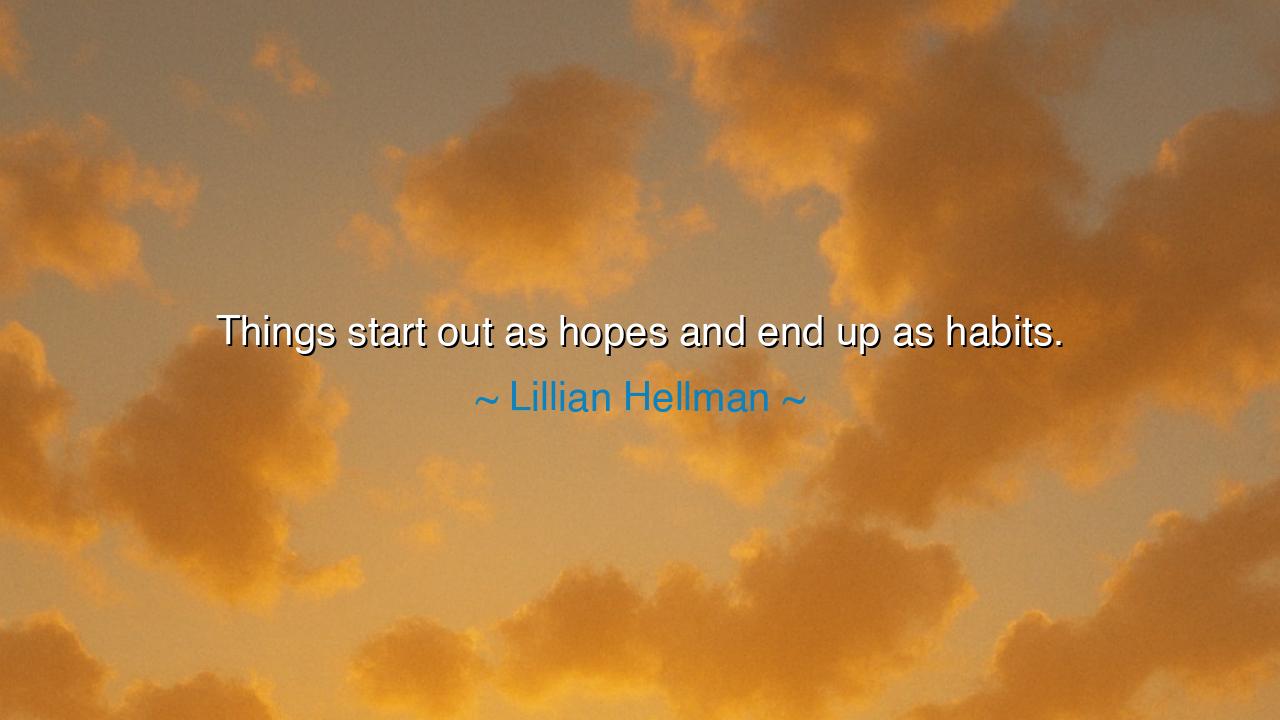
Things start out as hopes and end up as habits.






The words of Lillian Hellman — “Things start out as hopes and end up as habits.” — capture one of the deepest rhythms of the human soul: the transformation of aspiration into action, and of action into identity. Within this simple sentence lies a profound truth about the way dreams become real — not through sudden miracles, but through the slow, steady shaping of will. Hope is the seed, fragile and unseen beneath the soil; habit is the tree, standing firm through the seasons. Hellman, a playwright who witnessed the trials of conscience and character in turbulent times, understood that the greatest achievements — and the gravest failures — are not born in moments, but in patterns.
In the ancient world, philosophers spoke of the same law. Aristotle taught that virtue is not an act but a habit, born from the repetition of right choices until goodness becomes second nature. A man is not courageous because he dreams of bravery, but because he practices it again and again until fear loses its dominion. Hellman’s insight follows this eternal thread. Our hopes — those flickers of desire and belief — are the beginnings of all transformation. Yet unless they are nurtured, they fade. To make them lasting, one must forge them into habits, the daily rituals that turn longing into life.
Consider, for example, the story of Thomas Edison. His hope was simple — to bring light to the world. But that hope alone would have vanished into dust if not bound by habit. He failed hundreds, even thousands of times. Yet he rose each morning and worked again. In the forge of persistence, his hope became habit, and his habit became invention. This is the hidden alchemy Hellman describes — when the dream ceases to be a distant vision and becomes the very motion of one’s hands and the rhythm of one’s days. Hope gives birth; habit sustains life.
But Hellman’s quote carries not only inspiration, but warning. For habits are indifferent to morality — they grow from any seed, whether noble or corrupt. The same process that turns hope into virtue can turn desire into vice. The person who begins with a small indulgence, a lie, or a selfish act may find, in time, that sin too becomes habit — automatic, unthinking, a chain of their own making. Thus, the ancients taught the art of vigilance: to guard the first motions of the soul, for they are the architects of destiny. Every habit began once as a whisper of hope or a flicker of temptation.
Hellman, who lived through the storms of political persecution and moral compromise, spoke as one who had seen how ideals can decay or endure. In her plays and her life, she wrestled with conscience — with the question of how one keeps faith with one’s early hopes when the world grows cynical. Her words remind us that character is not shaped by grand declarations, but by the quiet repetitions of the heart. If we wish to preserve the purity of our hopes, we must train our daily actions to reflect them — to make our habits worthy of the dreams that gave them birth.
In this truth lies both power and peace. For if habit is destiny, then destiny lies in our hands. The person who dreams of kindness must practice kindness until it becomes instinct. The artist who dreams of mastery must labor even when inspiration sleeps. The seeker who longs for wisdom must read, think, and meditate until truth becomes the breath of their being. In the words of the ancients: “We become what we repeatedly do.” Hellman’s wisdom simply restates this with modern grace — that the bridge from hope to fulfillment is built from the stones of daily habit.
So, let this teaching be engraved in your heart: do not let your hopes die as wishes. Bring them to life through habit. Rise each day and act upon them, even in small ways. Do not wait for perfect conditions or sudden transformation. Every habit begins with a single repetition; every destiny begins with a single choice. For when your hopes have become habits, they will no longer depend on the fragile wind of feeling — they will live within you, steady as heartbeat and strong as faith. Thus, in time, you will find that your life itself has become the embodiment of your highest hopes — made real not by chance, but by the sacred discipline of habitual creation.






AAdministratorAdministrator
Welcome, honored guests. Please leave a comment, we will respond soon